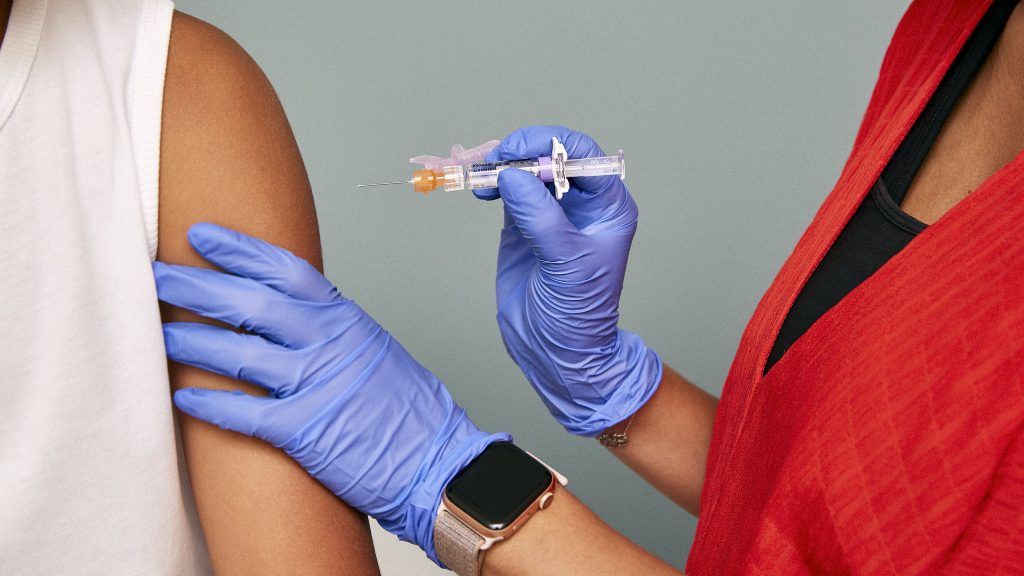Michigan’s Top Doctor on COVID-19 Surge, Omicron: “Our Best Bet” Is to Get Vaccination Rate Up
Dr. Natasha Bagdasarian says there are early signs that omicron is more contagious and there is still a lot to learn in terms of severity.

Michigan continues to see high COVID-19 case rates as hospitalizations reached a new high Wednesday, eclipsing the previous record for the fifth straight time that the state has reported data. Hospitals are being overwhelmed with the number of patients with nearly 4,700 patients statewide. A U.S. military medical team was deployed to Grand Rapids, Saginaw and Dearborn to relieve health care workers who are dealing with the latest surge of COVID-19 in the state.
Dr. Natasha Bagdasarian, who is the state’s chief medical executive, says some groups of people in the state are ahead of the average statewide vaccination rate.
“When we look at our 65, and up age group, vaccine uptake is really good. It is over 85%, 87% in that age group, and that’s why some of our elderly population has been able to avoid hospitalization and death.” –Dr. Natasha Bagdasarian, Michigan Department of Health and Human Services
Bagdasarian says the state has been making steady progress with vaccination rates among children ages 5-11. But, “we still have a lot of progress to make,” she says. “One of the things that we have seen in Michigan and around the country is that vaccine uptake has been markedly different as we look across different age groups. When we look at our 65-and-up age group, vaccine uptake is really good. It is over 85%, 87% in that age group, and that’s why some of our elderly population has been able to avoid hospitalization and death.”
However, Bagdasarian says vaccination numbers drop among younger age groups. For example, teens ages 12-15 are seeing 40% vaccination rates, which is behind the statewide rate right now of nearly 62%. The number of Americans fully vaccinated against COVID-19 reached 200 million Wednesday amid a spike in cases and hospitalizations.
“So what we really need to do as a community is make sure that we don’t have gaps like this, and that we don’t have large groups of unpopulated individuals who are going out into the community and fueling transmission.”
New cases in the U.S. climbed from an average of nearly 95,000 a day on Nov. 22 to almost 119,000 a day this week, and hospitalizations are up 25% from a month ago. The increases are due almost entirely to the delta variant, though the omicron mutation has been detected in about 20 states and is sure to spread even more.
Information Still Emerging on Omicron
Bagdasarian says details on omicron are still emerging. Scientists in South Africa have been keeping up with sequencing and sharing data on the new variant quickly.
“[The variant] may not have originated in South Africa, but they are the individuals who made it possible to warn the rest of the world,” she says.
The variant was first labeled in South Africa, where cases have increased rapidly. While illnesses among young, healthy individuals have been mild, Bagdasarian says there are early signs that omicron is more contagious and there is still a lot to learn in terms of severity.
“We really don’t understand what the severity will look like across the population. So we really need to see how omicron will affect those who are elderly or immunocompromised.”
The new variant has not only more mutations but more mutations in combinations that have not been seen before.
“There are some mutations that suggest there could be increased risk of reinfection. So people who’ve had COVID-19 infections before may still be at risk,” Bagdasarian says.
As more information comes out on omicron, she says her team is evaluating the data daily.
“We’re looking to see what vaccination will look like against omicron. We’re going to have to weigh our therapeutics and whether monoclonal antibodies are just as effective.”
Bagdasarian says vaccinating many people as possible is residents’ “best bet” going forward.
“We really need to get our vaccination rates up, not only to protect our community from severe illness and death, but also to prevent other variants from emerging.”
The Associated Press contributed to this report.
Trusted, accurate, up-to-date.
WDET strives to make our journalism accessible to everyone. As a public media institution, we maintain our journalistic integrity through independent support from readers like you. If you value WDET as your source of news, music and conversation, please make a gift today.
